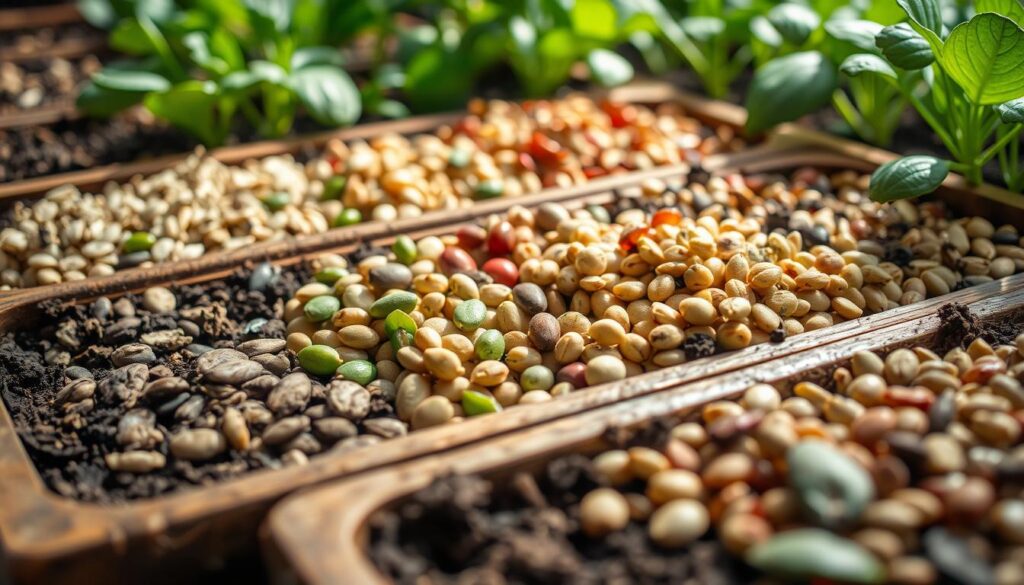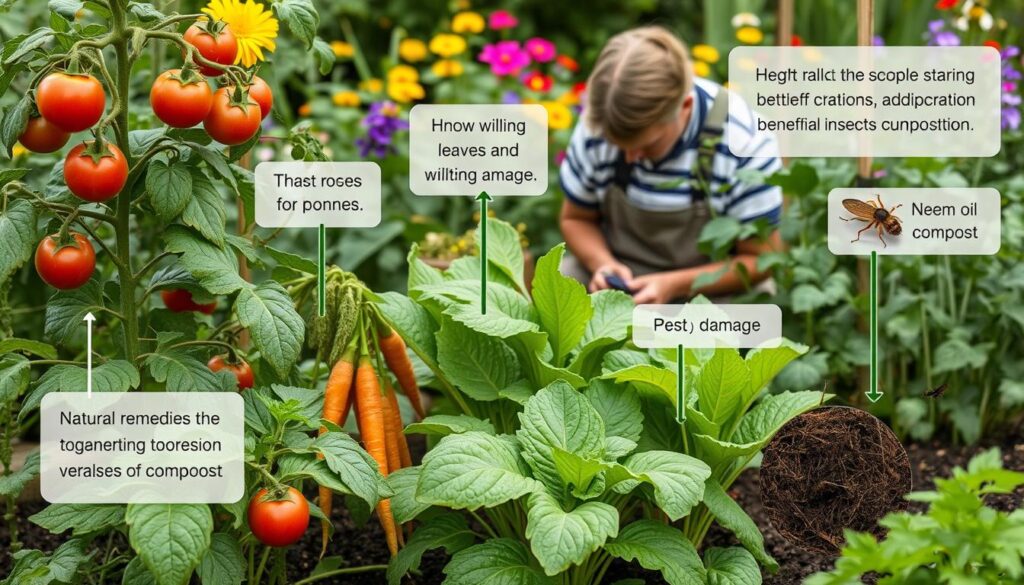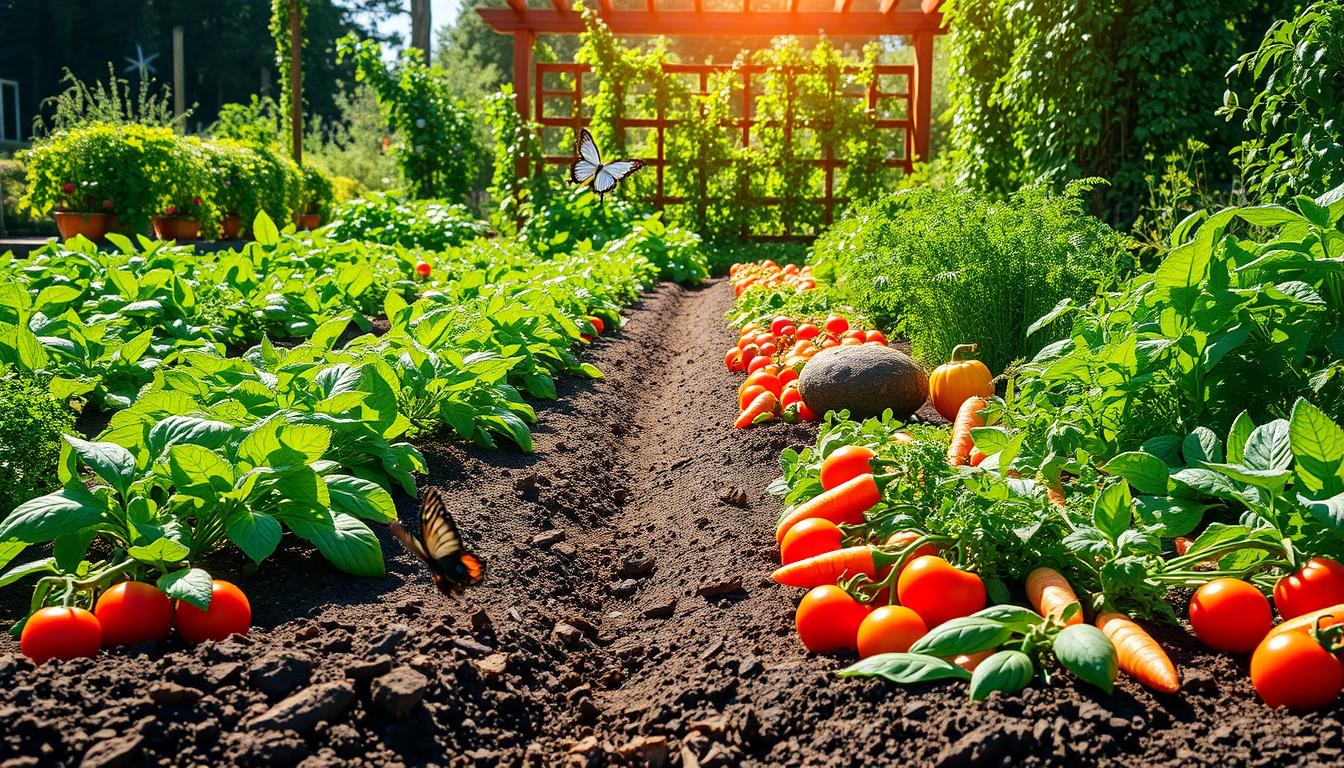In this guide, I’ll share the top 5 tips for growing organic veggies at home. You’ll learn how to naturally prepare your soil and control pests. These tips are perfect for both new and seasoned gardeners. They’ll help you grow healthy, chemical-free food right in your backyard.
Key Takeaways
- Learn the essential tips for growing organic vegetables in your garden
- Discover how to prepare your soil naturally for optimal plant growth
- Explore effective, eco-friendly pest control methods to protect your crops
- Uncover the benefits of home-grown, chemical-free produce
- Embrace a sustainable lifestyle by cultivating your own organic vegetable garden
Introduction: The Joys of Organic Gardening
Growing your own organic vegetables is a rewarding experience. It offers many benefits. By following organic gardening principles, you can create a garden that’s good for you and the planet. We’ll look at why growing organic vegetables is worth it and the many advantages of homegrown produce.
Why Grow Organic Vegetables?
Organic gardening is a green way to garden. It doesn’t use harmful chemicals. This keeps your family healthy and helps the environment.
When you grow your own organic veggies, you know they’re safe. They’re also full of good stuff your body needs.
The Benefits of Home-Grown Produce
Having your own homegrown produce is great. Organic veggies taste better and are more nutritious. They also look better than store-bought ones.
You’ll always have fresh, seasonal food ready to use. It’s convenient and delicious.
| Benefit | Description |
|---|---|
| Freshness | Homegrown produce is harvested at the peak of ripeness, ensuring maximum flavor and nutritional value. |
| Sustainability | Organic gardening reduces your carbon footprint and supports a healthier, more resilient ecosystem. |
| Cost-Savings | Growing your own vegetables can save you money on grocery bills, especially for organic produce. |
| Enjoyment | Tending to your garden and harvesting your own food can be a deeply satisfying and rewarding experience. |
Whether you’re new to gardening or have been doing it for years, organic gardening is rewarding. By growing your own homegrown produce, you enjoy the benefits of organic gardening. It’s a step towards a greener lifestyle.
Tip 1: Prepare Your Soil Naturally
The key to a great organic vegetable garden is the soil. Adding compost, rich in nutrients, is a vital first step. Composting turns food scraps and yard waste into a valuable soil enhancer. It makes the soil better for growing plants.
Composting: Nature’s Fertilizer
Composting is a big help for organic soil. It turns waste into a free, top-notch fertilizer for your plants. Composting for vegetable gardens boosts soil’s ability to hold water and nutrients. It also fights weeds and diseases.
To start composting, you need a bin or pile. Mix brown materials like leaves with green ones like fruit scraps. Turn the pile often and keep it moist. Soon, you’ll have a rich natural soil amendment for your garden.
Using organic soil preparation like composting makes your soil healthy. This effort will help your plants grow strong. Start composting to make your garden flourish.
Tip 2: Choose the Right Organic Seeds and Seedlings
Starting an organic vegetable garden? Picking the right seeds and seedlings is key. Go for high-quality, organic, and non-GMO options that fit your local climate. Heirloom seeds and non-GMO seedlings add variety and unique flavors to your garden.
Choosing organic and non-GMO seeds and seedlings means no synthetic pesticides or GMOs. Your garden will grow healthy, tasty food without harmful chemicals. Heirloom varieties often taste better and are more resilient than commercial hybrids.
- Look for trusted seed companies that offer organic and heirloom seeds.
- Choose varieties that match your climate and soil type.
- Start seeds indoors or buy non-GMO seedlings from a local nursery.
- Try different heirloom varieties for a colorful and flavorful garden.
| Vegetable Variety | Ideal Growing Conditions | Heirloom or Non-GMO Options |
|---|---|---|
| Tomatoes | Full sun, well-drained soil | Brandywine, Black Krim, Cherokee Purple |
| Carrots | Loose, sandy soil | Scarlet Nantes, Danvers, Purple Haze |
| Zucchini | Warm soil, ample moisture | Costata Romanesca, Ronde de Nice, Tromboncino |
By choosing the right organic seeds, non-GMO seedlings, and heirloom varieties, you’ll create a thriving garden. It will be full of healthy, delicious food.

Top 5 Tips for Growing Vegetables Organically in Your Garden
Growing an organic vegetable garden is rewarding and sustainable. Follow these top tips to grow your own food. You’ll enjoy fresh, healthy produce from your garden.
- Prioritize Soil Health – Healthy soil is key for growing plants. Add compost to feed the soil and help roots grow strong.
- Choose Heirloom and Open-Pollinated Varieties – Pick organic seeds and seedlings that fit your local climate. They’re more resilient and taste better.
- Embrace Companion Planting – Place plants together to keep pests away and attract good bugs. It creates a balanced garden ecosystem.
- Utilize Natural Pest Control Methods – Use organic pest control like neem oil or diatomaceous earth. Avoid harsh chemicals for a healthier garden.
- Mulch, Mulch, Mulch – Use organic mulch like straw to keep soil moist and weeds down. It also improves soil structure over time.
Follow these tips for organic vegetable gardening to grow a thriving garden. Enjoy the joy of harvesting your own food. It’s a great way to live an organic lifestyle.
“A garden is a grand teacher. It teaches patience and careful watchfulness; it teaches industry and thrift; above all it teaches entire trust.” – Gertrude Jekyll
Tip 3: Practice Companion Planting
In organic gardening, companion planting is a game-changer. It’s about placing plants together to help each other. This method boosts plant health and growth, and fights pests naturally.
Beneficial Plant Combinations
Choosing the right plants to pair is crucial. For instance, tomatoes and basil taste better together and keep pests away. Marigolds near your veggies can fight nematodes, harmful to roots.
Deterring Pests Naturally
- Nasturtiums attract ladybugs and lacewings, which eat aphids and other pests.
- Herbs like rosemary, thyme, and mint make your garden less welcoming to pests.
- Radishes with carrots confuse carrot flies, keeping them from your carrots.
Using plant synergies, you can grow a healthy, pest-free garden without chemicals. Companion planting techniques, natural pest control in organic gardens, and beneficial plant pairings are essential for sustainable gardening.
Tip 4: Embrace Organic Pest Control Methods
Dealing with pests can be tough for organic gardeners. But, there are many eco-friendly solutions. I’ll share organic pest management techniques. You’ll learn how to keep your veggies safe without using harmful chemicals.
Encouraging beneficial insects is key. Ladybugs, lacewings, and praying mantises eat pests like aphids. Planting flowers that attract them helps.
Creating your own natural sprays is another good idea. Mix water, castile soap, and essential oils like peppermint. It keeps insects away without harming your veggies or wildlife.
| Organic Pest Control Method | Benefits |
|---|---|
| Introducing Beneficial Insects | Promotes a balanced ecosystem and natural pest management |
| Using Homemade Natural Sprays | Safe, effective, and eco-friendly alternative to harsh chemicals |
| Companion Planting | Certain plants can deter pests and attract beneficial insects |
By using these organic methods, you can have a healthy garden. It’s full of life and doesn’t use harmful chemicals. With a bit of creativity, you can keep pests away and enjoy your organic veggies.
“The best defense against pests is a thriving, diverse garden ecosystem.”
Tip 5: Mulch, Mulch, Mulch
Using a thick layer of organic mulch around your plants is a simple yet powerful way to keep your garden healthy. This tip will show you how mulching helps with moisture, weed control, and soil health. You’ll see how this easy practice can boost your organic gardening.
The Many Benefits of Mulching
Organic mulching is key to a sustainable garden. By adding 2-4 inches of compost, grass clippings, or wood chips, you get many benefits:
- Moisture retention: Mulch keeps the soil moist, cutting down on watering and keeping plants hydrated.
- Weed suppression: A thick layer blocks sunlight and weeds, saving you time and effort on weeding.
- Soil fertility: As mulch breaks down, it adds nutrients to the soil, making your garden healthier.
- Temperature regulation: Mulch keeps the soil at the right temperature, helping plants grow better.
- Erosion prevention: Mulch holds the soil in place, stopping it from washing or blowing away.
Spending a little time on mulching can greatly benefit your vegetable garden. It leads to healthier plants, more yields, and a better gardening experience.
“Mulch is like a protective blanket for your vegetable garden, keeping it healthy and thriving throughout the growing season.”
Harvesting and Enjoying Your Organic Bounty
After following the top 5 tips for harvesting organic vegetables, it’s time to enjoy your hard work. Knowing when to pick homegrown produce is key. This ensures you get the freshest and tastiest vegetables from your organic garden.
When to Harvest Your Vegetables
Timing is crucial for harvesting organic vegetables. Each vegetable has its best time to pick. Here’s how to know when to pick homegrown produce:
- Leafy greens: Harvest leaves when they’re big enough to eat but not tough or bitter.
- Tomatoes: Pick when they’re fully ripe, with deep color and slight softness.
- Carrots: Gently pull them from the soil when the tops are about an inch in diameter.
- Beans: Snap off pods when they’re firm and seeds are just swelling.
- Zucchini: Harvest when they’re 6-8 inches long and skin is shiny and tender.
By watching for each vegetable’s signs of readiness, you’ll pick at the best time. This ensures your homegrown vegetables are at their peak flavor and nutrition.
“The true essence of gardening is in the joy of the harvest – the moment when you can pluck the fruits of your labor and savor their fresh, vibrant flavors.”
With practice, you’ll get better at maximizing yields from organic gardens. Enjoy the fruits of your labor with your homegrown vegetables.
Troubleshooting Common Organic Gardening Issues
Growing your own food is a joy. But, even the best gardeners face problems. Here, I’ll share ways to fix common troubleshooting organic gardening problems. These eco-friendly solutions will help your garden stay healthy.
Identifying and Addressing Plant Problems
Spotting and fixing garden issues is key. You might see pests or plants not getting enough nutrients. These common vegetable plant issues need quick action.
- Yellowing or wilting leaves: This could be a sign of overwatering, underwatering, or a nutrient deficiency. Adjust your watering schedule and consider adding organic compost or fertilizer.
- Holes or chewed leaves: Look for signs of insect pests, such as aphids, caterpillars, or beetles, and use organic pest control methods like companion planting or natural sprays.
- Stunted growth or poor fruit production: This may indicate a lack of sunlight, improper soil pH, or competition from weeds. Adjust your plant placement and ensure your garden is getting enough sunlight, and regularly remove weeds.
By watching your plants closely and acting fast, you can fix these common vegetable plant issues. This way, your garden will stay healthy and productive.

Success in organic gardening comes from patience, watching, and trying new things. With a bit of troubleshooting and creative problem-solving, you can beat any gardening challenge. And enjoy a harvest full of fresh, tasty produce.
Conclusion: Embracing a Sustainable Lifestyle
By following the top 5 tips for growing vegetables organically, you’ll create a garden full of fresh, chemical-free food. This not only makes your garden healthy but also helps the planet. Growing your own food is good for you, the environment, and your happiness.
Starting an eco-friendly lifestyle through organic gardening is a journey that’s both rewarding and empowering. It lets you play a big role in making the world greener. By using natural soil care, choosing the right organic seeds, and using green pest control, you help nature and cut down on pollution.
Enjoying the food you grow and seeing your garden flourish is truly rewarding. It shows the power of sustainable home gardening. This practice is a big step towards living in a way that’s better for you and the Earth.



Leave a Reply